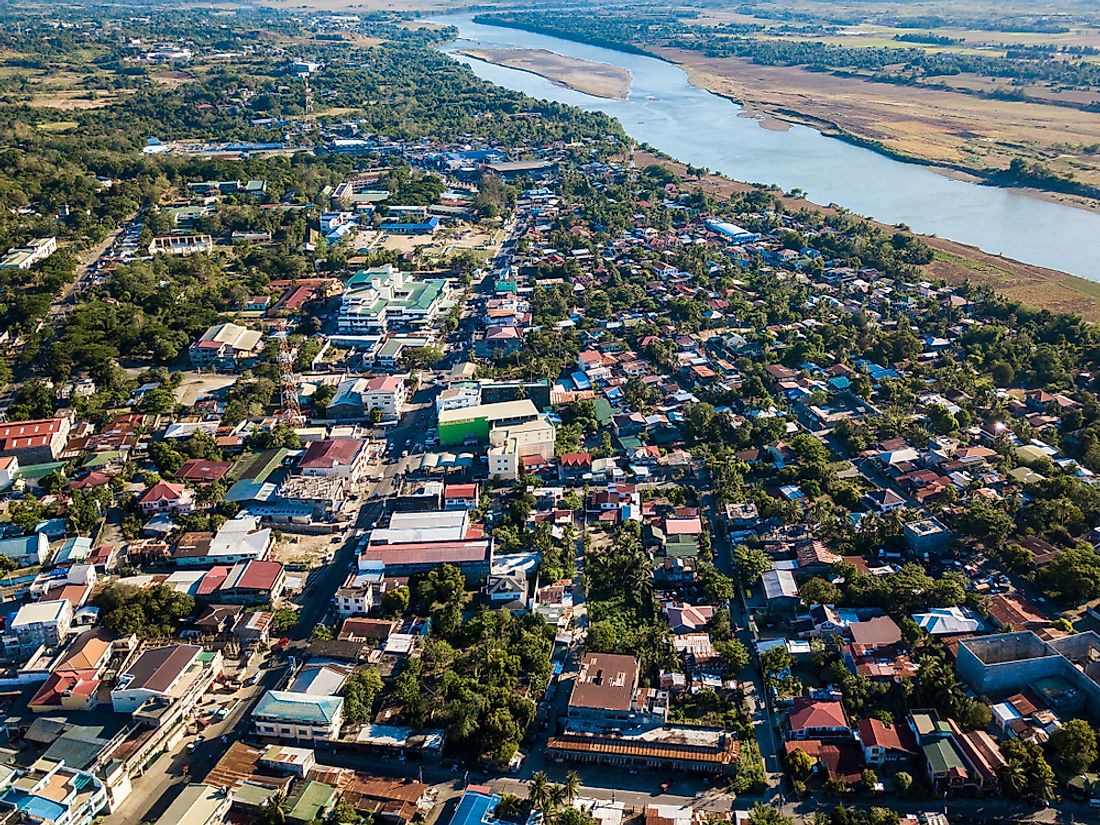The Longest Rivers In the Philippines

The Republic of the Philippines is located in the western Pacific Ocean and is made up of 7,641 islands. It has a population of 100,981,437 people, with the Visayan and Tagalog peoples being the largest ethnic groups. The capital city is Manila with Quezon City being the most populous. The highlands are mountainous and of volcanic nature and are covered by tropical rainforest. The country experiences a tropical maritime climate which is hot and humid. Notable physical features include Mount Apo (the county's highest peak at 9,692 feet), the Philippine Trench, the San Juanico Strait, and Laguna de Bay.
Cagayan
The River Cagayan is locally referred to as the Rio Grande de Cagayan. It flows from the Caraballo Mountains covering 314 miles to the Babuyan Channel into the Philippine Sea, with the water generally flowing from south to north. This river experiences severe flooding due to high rainfall of up to 300 millimeters annually and surface retention that causes the water to move slowly. Valleys along the river are very fertile, and farmers grow rice, coconut, citrus, and tobacco. There are two dams which have been built on two of its tributaries. The national government has developed tourism along the river. The Ibanag community derives their name from the river’s former name, Banag. The river has a wide variety of fish including a rare riverine fish locally known as ludong (Cestreaus plicatilis).
Mindanao
The River Mindano is the second longest river in the Philippines, stretching out over a total of 232 miles. The river's four major tributaries are the Allah River, Buluan River, Pulangi River, and the M’lang River. At its mouth at Illana Bay, it forms two distributaries, the Cotabato and Tamontaka. The river is an important transport artery for the towns along its banks.
Agusan
The River Agusan flows 217 miles along the Compostela Valley and drains into Butuan Bay. The most illustrious feature of this river is the Agusan Mash which covers 19,197 hectares. It serves to reduce flash floods. It is home to over 200 bird species and many other endangered species of plants and animals. It has been declared a wildlife sanctuary. Communities found along the river include Mamanua, Manobo, Mgahat, and Mandaya. Their economic activities are farming and subsistence fishing with rice being the leading food crop and coconut the leading cash crop.
Pulangi
The River Pulangi is the largest tributary of the River Mindanao. It stretches 199 miles and has the largest watershed in the Philippines covering an area of 1.8 million hectares. A power station has been built along the river with a production capacity of 255 megawatts, and another one has been proposed with a projected capacity of over 300 megawatts. This project has sparked opposition with some arguing that the dam would submerge the grave of ancient ancestors known as Apo Mamalu. Tributaries feeding the river include the Manupali River, Muleta River, Bobonawan River, Tigwa River, and Bukidnon River.
Pampanga
The source of this river is in the Sierra Madre highlands and it drains into Manila Bay at Bulacan, covering a distance of 162 miles from its source to its mouth. Its tributaries are the Rio Chico, the Penaranda River, and the Coronel-Santor River. Three dams have been constructed along this river, and they provide water for irrigation to the residents of Nueva Ecija province. At the lower end of the river, the water is used in fish farming and a newly constructed irrigation scheme.
Longest Rivers In The Philippines
| Rank | Longest Rivers in the Philippines | Length |
|---|---|---|
| 1 | Cagayan | 314 miles |
| 2 | Mindanao | 232 miles |
| 3 | Agusan | 217 miles |
| 4 | Pulangi | 199 miles |
| 5 | Pampanga | 162 miles |
| 6 | Agno | 128 miles |
| 7 | Abra | 111 miles |
| 8 | Abulog | 109 miles |
| 9 | Chico | 109 miles |
| 10 | Davao | 93 miles |











